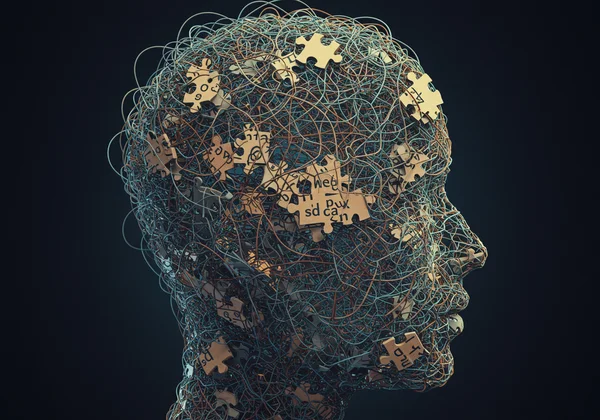แบบทดสอบโรคจิตเภท: ทำความเข้าใจอาการด้านลบและอาการเกี่ยวกับความคิด
เมื่อเรานึกถึงโรคจิตเภท จิตใจของเรามักจะนึกถึงอาการที่รุนแรงซึ่งปรากฏในภาพยนตร์ ไม่ว่าจะเป็นอาการประสาทหลอน อาการหลงผิด หรืออาการหวาดระแวง แม้ว่าสิ่งเหล่านี้จะเป็นส่วนหนึ่งของภาพรวมสำหรับบางคน แต่ก็ไม่ได้บอกเล่าเรื่องราวทั้งหมด บุคคลจำนวนมากประสบกับความท้าทายที่แตกต่างออกไปและเงียบกว่า ซึ่งอาจก่อกวนได้ไม่แพ้กัน คุณเคยสงสัยไหมว่า ฉันเป็นโรคจิตเภทหรือเปล่า เพราะคุณหรือคนที่คุณรักรู้สึกเก็บตัว มี หมอกในใจ หรือขาดแรงจูงใจอย่างมาก?
คุณไม่ได้อยู่คนเดียวกับความสับสนนี้ โรคจิตเภทมีอาการที่ละเอียดอ่อนแต่สำคัญหลากหลาย ซึ่งอาจถูกมองข้ามหรือเข้าใจผิดว่าเป็นอย่างอื่นได้ง่าย คู่มือนี้มีขึ้นเพื่อให้ความกระจ่างเกี่ยวกับสัญญาณที่ไม่ค่อยมีคนรู้จักเหล่านี้ เพื่อช่วยให้คุณพบความชัดเจน หากประสบการณ์เหล่านี้ตรงกับคุณ การ ประเมินตนเองแบบเป็นความลับ อาจเป็นก้าวแรกที่เป็นประโยชน์ในการทำความเข้าใจ
ทำความเข้าใจอาการด้านลบของโรคจิตเภท
คำว่า "ด้านลบ" ในบริบทนี้ไม่ได้หมายถึง "ไม่ดี" แต่หมายถึงการไม่มีอยู่หรือการลดลงของการทำงานตามปกติ เช่น แรงจูงใจ ความสนใจทางสังคม หรือการแสดงออกทางอารมณ์ อาการเหล่านี้อาจส่งผลกระทบอย่างมาก เพราะมันพรากคุณภาพชีวิตไปจากบุคคล มักจะพัฒนาอย่างค่อยเป็นค่อยไป ทำให้ยากที่จะระบุว่าเป็นปัญหาที่ร้ายแรง จนกว่าจะส่งผลกระทบอย่างมีนัยสำคัญต่อกิจวัตรประจำวัน
ต่างจาก "อาการด้านบวก" ที่ชัดเจนกว่า (เช่น อาการประสาทหลอน ซึ่งเพิ่มประสบการณ์) อาการด้านลบคือสิ่งที่ขาดหายไป ความละเอียดอ่อนนี้เป็นเหตุผลที่มักถูกเข้าใจผิดว่าเป็นลักษณะนิสัย ความเกียจคร้าน หรือภาวะซึมเศร้า การทำความเข้าใจความแตกต่างเหล่านี้เป็นส่วนสำคัญในการจดจำสัญญาณเริ่มต้นของโรคจิตเภท

อาการเฉยเมยทางอารมณ์ (Blunted Affect) คืออะไร?
หนึ่งในอาการด้านลบที่พบบ่อยที่สุดคือสิ่งที่ผู้เชี่ยวชาญเรียกว่า blunted affect หรืออาการเฉยเมยทางอารมณ์ นี่ไม่ใช่ความรู้สึกว่างเปล่าภายใน แต่เป็นการลดลงของความสามารถในการแสดงออกทางอารมณ์ภายนอก บุคคลอาจไม่ยิ้มเมื่อมีข่าวดีหรือไม่แสดงความเศร้าเมื่อสูญเสีย ใบหน้าของพวกเขาอาจดูไม่มีชีวิตชีวา และเสียงของพวกเขาอาจฟังดูราบเรียบ ขาดขึ้นๆ ลงๆ ตามปกติของการสนทนา
สำหรับคนที่คุณรัก สิ่งนี้อาจทำให้สับสนได้ อาจดูเหมือนว่าบุคคลนั้นไม่สนใจอีกต่อไป ทำให้เกิดระยะห่างในความสัมพันธ์ สำหรับบุคคลที่ประสบปัญหานี้ พวกเขาอาจยังคงรู้สึกถึงอารมณ์ภายใน แต่พบว่าเป็นไปไม่ได้ที่จะแสดงออก ราวกับว่ามีความไม่เชื่อมโยงกันระหว่างโลกภายในกับการแสดงออกภายนอก
Avolition: อธิบายการขาดแรงจูงใจอย่างรุนแรง
คุณหรือคนที่คุณรู้จักเคยหมดแรงขับเคลื่อนที่จะทำงานง่ายๆ ในชีวิตประจำวันหรือไม่? นี่เป็นมากกว่าแค่การผัดวันประกันพรุ่งหรือความเกียจคร้าน Avolition คือการขาดแรงจูงใจอย่างรุนแรงที่ทำให้การเริ่มต้นและทำกิจกรรมที่มุ่งเน้นเป้าหมายให้สำเร็จรู้สึกเหมือนเป็นความท้าทายที่ไม่อาจเอาชนะได้ สิ่งนี้อาจส่งผลกระทบต่อสุขอนามัยส่วนบุคคล การเรียน ความรับผิดชอบในอาชีพ และแม้กระทั่งงานอดิเรกที่เคยชื่นชอบ
ไม่ใช่ทางเลือก บุคคลที่ประสบภาวะ avolition อาจต้องการลุกขึ้นอาบน้ำหรือทำงานให้เสร็จ แต่พวกเขารู้สึกไม่สามารถทำได้ สิ่งนี้อาจนำไปสู่ความบกพร่องอย่างมีนัยสำคัญในการทำงานทางสังคมและอาชีพ และมักจะเป็นหนึ่งในแง่มุมที่ทำให้พิการมากที่สุดของโรค
Alogia และ Anhedonia: ความยากลำบากในการพูดและการหาความสุข
อาการด้านลบที่สำคัญอีกสองประการคือ alogia และ anhedonia Alogia หรือ "การพูดน้อย" แสดงออกเป็นการลดปริมาณการพูด การสนทนาอาจจำกัดอยู่เพียงคำตอบสั้นๆ ที่ว่างเปล่า บุคคลนั้นดูเหมือนจะไม่มีอะไรจะพูด ไม่ใช่เพราะพวกเขาเก็บความลับ แต่เป็นเพราะความคิดไม่ได้ก่อตัวขึ้นอย่างง่ายดาย
Anhedonia คือการไม่สามารถสัมผัสประสบการณ์ความสุขจากกิจกรรมที่เคยสนุกสนานได้ อาหารโปรด งานอดิเรกที่รัก หรือการใช้เวลากับเพื่อนอาจไม่นำมาซึ่งความสุขหรือความพึงพอใจอีกต่อไป สิ่งนี้มีส่วนสำคัญต่อการถอนตัวทางสังคม เนื่องจากการปฏิสัมพันธ์สูญเสียคุณภาพที่ให้รางวัล การทดสอบสัญญาณเริ่มต้นของโรคจิตเภทสามารถช่วยระบุได้ว่ารูปแบบเหล่านี้เป็นสาเหตุที่น่ากังวลหรือไม่
สำรวจอาการทางความคิดของโรคจิตเภท
นอกเหนือจากอาการด้านลบแล้ว ยังมี อาการทางความคิดของโรคจิตเภท ที่ส่งผลต่อวิธีที่บุคคลคิด สิ่งเหล่านี้อาจเป็นอาการที่ละเอียดอ่อนที่สุด และมักจะตรวจพบได้จากการทดสอบเฉพาะเท่านั้น อย่างไรก็ตาม สิ่งเหล่านี้ก่อให้เกิดความคับข้องใจอย่างมากในชีวิตประจำวัน ส่งผลกระทบต่อความจำ ความสนใจ และความสามารถในการวางแผน สำหรับหลายคน ความท้าทายทางความคิดเหล่านี้เป็นส่วนสำคัญของการต่อสู้ของพวกเขา
ปัญหาเหล่านี้ไม่เกี่ยวข้องกับสติปัญญา แต่เกี่ยวข้องกับ "หน้าที่บริหาร" ของสมอง ซึ่งเป็นกระบวนการที่ช่วยให้เราจัดระเบียบความคิด จัดการเวลา และตัดสินใจ เครื่องมือ คัดกรองเบื้องต้นฟรี สามารถช่วยให้ข้อมูลเชิงลึกว่าความท้าทายทางความคิดเหล่านี้สมควรได้รับการสำรวจเพิ่มเติมหรือไม่

ความคิดที่สับสนรู้สึกอย่างไร?
ความคิดที่สับสน เป็นอาการทางความคิดที่เป็นลักษณะเฉพาะ มันอาจรู้สึกเหมือนสมองของคุณเป็นตู้เก็บเอกสารที่ยุ่งเหยิง ซึ่งคุณไม่สามารถหาโฟลเดอร์ที่ถูกต้องได้ ความคิดอาจปะปนกัน สูญเสียการเชื่อมโยงทางตรรกะ หรือเลือนหายไปก่อนที่คุณจะเข้าใจได้อย่างถ่องแท้ สิ่งนี้อาจทำให้การสนทนาที่สอดคล้องกันหรือการติดตามโครงเรื่องของรายการทีวีเป็นเรื่องยากอย่างเหลือเชื่อ
ภายนอก สิ่งนี้อาจปรากฏเป็นการพูดที่ยากต่อการติดตาม กระโดดจากหัวข้อหนึ่งไปยังอีกหัวข้อหนึ่งที่ไม่เกี่ยวข้องกัน ในกรณีที่รุนแรงกว่า คำพูดของบุคคลอาจปะปนกันจนกลายเป็นที่รู้จักกันในชื่อ "word salad" (การพูดที่สับสนจนฟังไม่รู้เรื่อง) ประสบการณ์นี้มักจะทำให้สับสนและโดดเดี่ยวสำหรับบุคคลนั้น
ความท้าทายเกี่ยวกับความจำและสมาธิ
ปัญหาสำคัญเกี่ยวกับความจำและสมาธิก็เป็นเรื่องปกติเช่นกัน นี่ไม่ใช่แค่การลืมว่าคุณวางกุญแจไว้ที่ไหน แต่อาจแสดงออกเป็นการเรียนรู้ข้อมูลใหม่ๆ ได้ยาก การจำนัดหมาย หรือการจดจ่อกับงานเป็นเวลามากกว่าสองสามนาที "หมอกในใจ" นี้สามารถทำให้ความสำเร็จทางวิชาการและวิชาชีพเป็นเรื่องที่ท้าทายอย่างยิ่ง
บางคนอาจต้องอ่านหน้าเดียวกันของหนังสือซ้ำหลายครั้งโดยไม่ซึมซับข้อมูล พวกเขาอาจพยายามทำตามคำแนะนำหลายขั้นตอน ซึ่งนำไปสู่ความคับข้องใจและความรู้สึกไม่เพียงพอ ความท้าทายเหล่านี้เป็นส่วนหนึ่งของอาการป่วย ไม่ใช่สัญญาณของความพยายามที่ไม่ดี
"หน้าที่บริหาร": ปัญหาเกี่ยวกับการวางแผนและการตัดสินใจ
หน้าที่บริหาร คือชุดเครื่องมือทางจิตของเราในการทำงานให้สำเร็จ ซึ่งรวมถึงความสามารถในการจัดระเบียบข้อมูล วางแผนการดำเนินการ และตัดสินใจอย่างมีเหตุผล เมื่อสิ่งนี้บกพร่องจากโรคจิตเภท งานง่ายๆ เช่น การวางแผนรายการซื้อของรายสัปดาห์ หรือการตัดสินใจว่าจะสวมใส่อะไรก็อาจกลายเป็นเรื่องที่หนักหน่วงได้
ความยากลำบากในการจัดระเบียบและวางแผนนี้อาจทำให้การจัดการการเงิน การดูแลบ้าน หรือการทำงานเป็นเรื่องยาก สิ่งนี้แสดงถึงการต่อสู้เพื่อประมวลผลข้อมูลและใช้มันเพื่อนำทางพฤติกรรมได้อย่างมีประสิทธิภาพ การตระหนักถึงความยากลำบากในการทำงานเหล่านี้เป็นขั้นตอนที่สำคัญ หากคุณสงสัยว่าจะทดสอบโรคจิตเภทได้อย่างไร การสังเกตรูปแบบเหล่านี้อาจเป็นจุดเริ่มต้นในการค้นหา แบบทดสอบโรคจิตเภทฟรี
โรคจิตเภทชนิดไม่รุนแรงในชีวิตประจำวันมีลักษณะอย่างไร?
แล้ว โรคจิตเภทชนิดไม่รุนแรงมีลักษณะอย่างไร เมื่อคุณรวบรวมชิ้นส่วนทั้งหมดเข้าด้วยกัน? มักจะไม่ดูเหมือนวิกฤต แต่จะปรากฏเป็นการลดลงของการทำงานอย่างช้าๆ ที่น่าสับสน นักเรียนที่เก่งอาจเริ่มสอบตก วัยรุ่นที่เข้าสังคมอาจเริ่มเก็บตัวและโดดเดี่ยว หรือพนักงานที่น่าเชื่อถืออาจเริ่มพลาดกำหนดส่งงาน
สัญญาณเงียบๆ เหล่านี้เป็นสิ่งที่มักถูกมองข้ามไปนานที่สุด เนื่องจากขาดความรุนแรงของอาการโรคจิต จึงสามารถถูกมองข้ามไปได้ง่าย อย่างไรก็ตาม สิ่งเหล่านี้ก่อให้เกิดความทุกข์อย่างแท้จริง และเป็นเหตุผลที่ถูกต้องในการค้นหาคำตอบ

อาการเหล่านี้อาจถูกเข้าใจผิดว่าเป็นภาวะซึมเศร้าหรือความเกียจคร้านได้อย่างไร
การทับซ้อนกันระหว่างอาการเหล่านี้กับภาวะอื่นๆ มีนัยสำคัญ การขาดแรงจูงใจ การถอนตัวทางสังคม และ anhedonia ก็เป็นสัญญาณคลาสสิกของภาวะซึมเศร้าเช่นกัน นี่คือเหตุผลที่การประเมินอย่างละเอียดมีความสำคัญอย่างยิ่ง ในทำนองเดียวกัน สังคมอาจติดป้ายอย่างไม่ยุติธรรมว่าบุคคลที่กำลังต่อสู้กับ avolition ว่า "ขี้เกียจ" หรือบุคคลที่มีปัญหาทางความคิดว่า "ไม่ฉลาด"
การทำความเข้าใจว่าสิ่งเหล่านี้เป็นอาการที่อาจเกิดขึ้นจากภาวะทางการแพทย์ที่ร้ายแรงจะช่วยขจัดความอัปยศและเปิดประตูสู่ความเห็นอกเห็นใจและการสนับสนุนที่เหมาะสม เป็นเรื่องของการตระหนักว่าอาจมีเหตุผลทางชีวภาพสำหรับการเปลี่ยนแปลงพฤติกรรมเหล่านี้ หากคุณไม่แน่ใจ การทำ แบบทดสอบประเมินโรคจิตเภท ทางออนไลน์อาจเป็นวิธีส่วนตัวในการรวบรวมข้อมูลเพิ่มเติม
การจดจำสัญญาณเตือนภัยล่วงหน้า
ระยะอาการนำ (prodromal phase)—ช่วงเวลาก่อนที่อาการโรคจิตเต็มรูปแบบครั้งแรกจะเกิดขึ้น—มักมีอาการด้านลบและอาการทางความคิดเหล่านี้ การจดจำสัญญาณเตือนภัยล่วงหน้าเหล่านี้เป็นสิ่งสำคัญอย่างยิ่ง เนื่องจากการแทรกแซงตั้งแต่เนิ่นๆ สามารถนำไปสู่ผลลัพธ์ระยะยาวที่ดีขึ้นอย่างมีนัยสำคัญ หากคุณสังเกตเห็นรูปแบบของการแยกตัวทางสังคมที่เพิ่มขึ้น ประสิทธิภาพการเรียนหรือการทำงานที่ลดลง สมาธิที่ลดลง และการขาดอารมณ์หรือแรงจูงใจโดยทั่วไปในตัวคุณเองหรือคนที่คุณรัก ก็ถึงเวลาที่จะต้องให้ความสนใจ
สัญญาณเหล่านี้เป็นสัญญาณให้คุณก้าวต่อไป ไม่ใช่เรื่องของการด่วนสรุป แต่เป็นการดำเนินการเชิงรุก แบบทดสอบเบื้องต้นสำหรับโรคจิตเภท สามารถเป็นแหล่งข้อมูลที่มีค่าและเป็นความลับเพื่อช่วยคุณจัดระเบียบข้อกังวลของคุณก่อนที่จะพูดคุยกับผู้เชี่ยวชาญ
ก้าวแรกสู่ความเข้าใจและความชัดเจนของคุณ
การมองข้าม ภาพเหมารวมที่พบบ่อย เป็นสิ่งสำคัญอย่างยิ่งในการทำความเข้าใจโรคจิตเภทอย่างแท้จริง อาการด้านลบและอาการทางความคิดที่เงียบงันและมักมองไม่เห็น—เช่น อาการเฉยเมยทางอารมณ์ การขาดแรงจูงใจอย่างรุนแรง หมอกในใจ และความคิดที่สับสน—เป็นของจริง มีความถูกต้อง และส่งผลกระทบอย่างลึกซึ้ง การจดจำสิ่งเหล่านี้ในตัวคุณเองหรือคนที่คุณรักเป็นก้าวแรกที่กล้าหาญในการแสวงหาความช่วยเหลือและค้นหาความชัดเจน ประสบการณ์เหล่านี้ไม่ใช่สัญญาณของความล้มเหลวส่วนบุคคล แต่อาจเป็นตัวบ่งชี้ถึงภาวะสุขภาพที่ซับซ้อน
หากบทความนี้โดนใจคุณ คุณไม่จำเป็นต้องแบกรับคำถามของคุณเพียงลำพัง เราขอแนะนำให้คุณ ทำแบบทดสอบฟรีและเป็นความลับของเรา เป็นการประเมินตนเองที่เป็นความลับและเข้าถึงได้ง่าย ซึ่งออกแบบมาเพื่อให้ข้อมูลเชิงลึกเบื้องต้นจากประสบการณ์ล่าสุดของคุณ สิ่งนี้สามารถเป็นเครื่องมือที่มีค่าอย่างยิ่งในการช่วยให้คุณจัดโครงสร้างความคิดและตัดสินใจเกี่ยวกับขั้นตอนต่อไปของคุณ

ข้อจำกัดความรับผิดชอบ: บทความนี้มีวัตถุประสงค์เพื่อให้ข้อมูลเท่านั้น เครื่องมือประเมินตนเองบนเว็บไซต์นี้เป็นแหล่งข้อมูลการคัดกรองเบื้องต้น และไม่ใช่สิ่งทดแทนการวินิจฉัยทางการแพทย์จากผู้เชี่ยวชาญ ผลลัพธ์ไม่สามารถยืนยันการมีอยู่หรือไม่มีอยู่ของภาวะทางการแพทย์ใดๆ โปรดปรึกษาผู้เชี่ยวชาญด้านสุขภาพที่มีคุณสมบัติเหมาะสม เช่น จิตแพทย์หรือนักจิตวิทยา เพื่อการวินิจฉัยที่แม่นยำและคำแนะนำการรักษาที่เหมาะสม
คำถามที่พบบ่อยเกี่ยวกับอาการของโรคจิตเภท
5 สัญญาณของโรคจิตเภทคืออะไร?
แม้ว่าอาการจะแตกต่างกันไป แต่สัญญาณ 5 ประการที่ได้รับการยอมรับโดยทั่วไป ได้แก่: 1) อาการประสาทหลอน (เช่น ได้ยินเสียง), 2) อาการหลงผิด (ความเชื่อที่รุนแรงและผิดพลาด), 3) ความคิดที่สับสน และการพูด, 4) อาการด้านลบ เช่น อาการเฉยเมยทางอารมณ์หรือการขาดแรงจูงใจ, และ 5) การทำงานในชีวิตประจำวันที่ลดลงอย่างมีนัยสำคัญ (เช่น ในที่ทำงานหรือในความสัมพันธ์)
โรคจิตเภทเริ่มต้นอย่างไร?
โรคจิตเภทมักจะเริ่มต้นอย่างค่อยเป็นค่อยไปในช่วง "ระยะอาการนำ" ซึ่งอาจกินเวลาหลายเดือนหรือหลายปี สัญญาณเริ่มต้นมักจะเป็นอาการด้านลบและอาการทางความคิดที่ละเอียดอ่อนซึ่งกล่าวถึงในบทความนี้: การถอนตัวทางสังคม การเรียนหรือประสิทธิภาพการทำงานที่ลดลง ปัญหาในการมีสมาธิ และการดูแลตนเองที่ลดลง สัญญาณเริ่มต้นเหล่านี้มักถูกเข้าใจผิดว่าเป็นอาการปกติของวัยรุ่นหรือภาวะซึมเศร้า
โรคจิตเภทชนิดไม่รุนแรงมีลักษณะอย่างไร?
โรคจิตเภทชนิดไม่รุนแรงมีลักษณะอย่างไร ในทางปฏิบัติมักจะเป็นบุคคลที่สามารถใช้ชีวิตได้แต่ประสบปัญหาอย่างมาก พวกเขาอาจทำงานได้ แต่พบว่าการมีปฏิสัมพันธ์ทางสังคมทำให้เหนื่อยล้าและสับสน พวกเขาอาจดูแปลกประหลาด เข้าสังคมไม่เก่ง หรือขาดแรงจูงใจอย่างต่อเนื่อง ความคิดของพวกเขาอาจสับสน และพวกเขาอาจมีปัญหาเกี่ยวกับความจำและการวางแผน แม้จะไม่มีอาการโรคจิตที่รุนแรงก็ตาม หากคุณสงสัยสัญญาณเหล่านี้ แบบทดสอบโรคจิตเภทสำหรับวัยรุ่น อาจให้ข้อมูลเบื้องต้นที่เป็นประโยชน์ได้